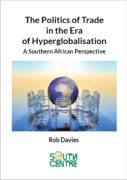Value Chain
The Politics of Trade in the Era of Hyperglobalisation: A Southern African Perspective
 About the Book:
About the Book:
Matters of international trade are increasingly widely recognised as major shapers of global politics. News bulletins are giving more and more coverage to matters like the so-called “trade wars” between the United States and China. These are, indeed, increasingly defining relations between the two largest economies in the world and could well underpin a multi-dimensional rivalry that could be a central feature of international relations for many years to come. Brexit is dominating and indeed re-shaping politics in the United Kingdom. By definition a rejection of a regional integration arrangement, Brexit has also revealed under-currents profoundly shaped by the outcome of a broader trade-driven process called “globalisation”. Just as regional integration is weakening in Europe, African countries have taken decisions that could lead to the most profound and ambitious step forward in African regional integration – the establishment of an African Continental Free Trade Area (AfCFTA). This study seeks to present an analysis of the political economy of trade negotiations over the past quarter century on two main fronts: the multi-lateral and those pertaining to regional integration on the African continent.
Author: Rob Davies is former South African Minister of Trade and Industry.
(more…)
Industrialization, inequality and sustainability: What kind of industry policy do we need?
The 2030 Agenda includes as Sustainable Development Goal 9 (SDG 9) the commitment to “build resilient infrastructure, promote inclusive and sustainable industrialization and foster innovation”. The entry of this goal into the 2030 Agenda is an achievement for developing countries who have a very diverse situation in terms of population sizes, per capita incomes, economic sizes and structures, political systems, cultures but share the common feature of an underdeveloped industrial sector.Therefore, in order to implement SDG 9 pro-active industry policies are needed that take into account aspects of inequality and sustainability.
(more…)
Global Value Chains (GVCs) from a Development Perspective
The current discourse on Global Value Chains by key proponents and also the WTO Secretariat is that developing countries should liberalise – in goods and services, and conclude a Trade Facilitation Agreement. (more…)
Changes in the Governance of Global Value Chains of Fresh Fruits and Vegetables: Opportunities and Challenges for Producers in Sub-Saharan Africa.
Horticultural trade, especially fresh fruits and vegetables from Sub-Saharan African to European market, has received a great deal of attention over the past decade due to the rapid and sustained growth of its exports to Europe. This impressive growth has undoubtedly contributed to increased national incomes and has reduced rural poverty in Sub-Saharan Africa. (more…)
Market Power, Price Formation and Primary Commodities.
There has been widespread concern for many years over the very abstract nature of orthodox economic theory, especially that of the neo-classical school which has dominated the profession since the late 19th century. Such disquiet is frequently felt among non-economists, but a great many dissident economists have also expressed their disquiet over the years. (more…)
 About the Book:
About the Book:











